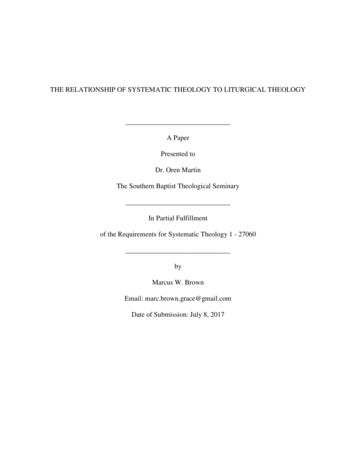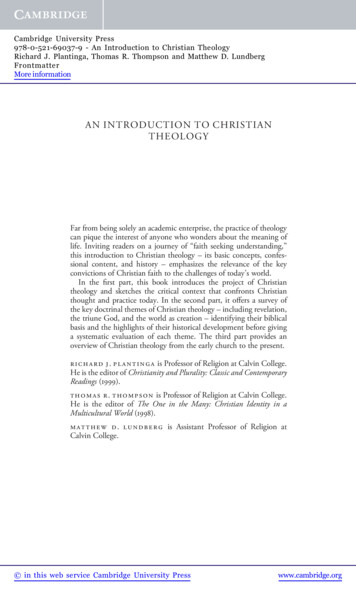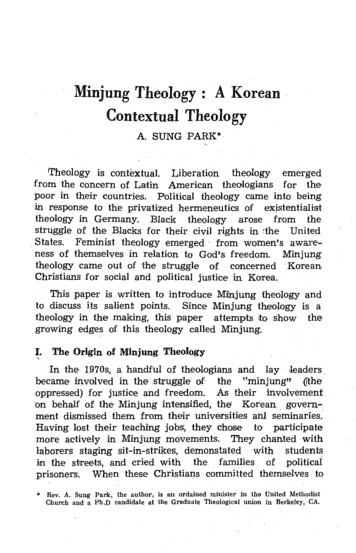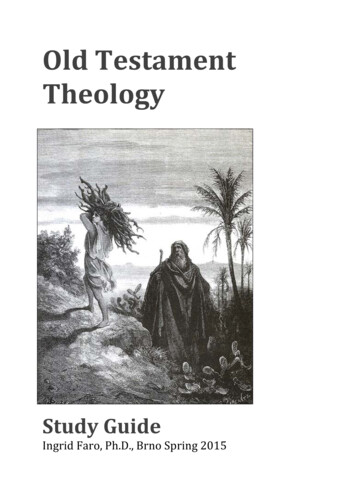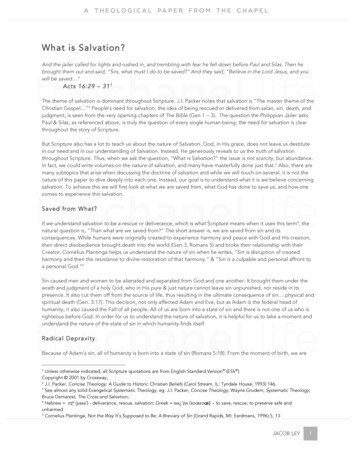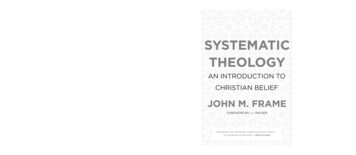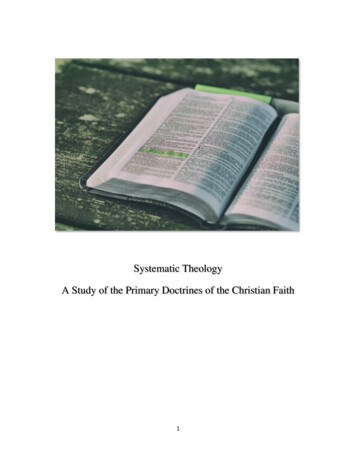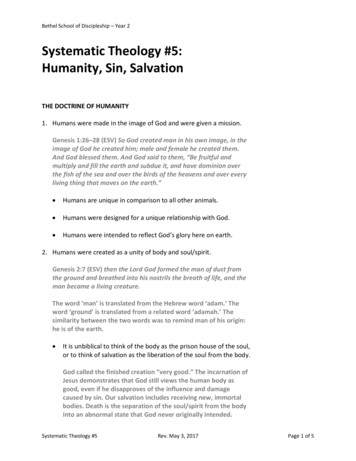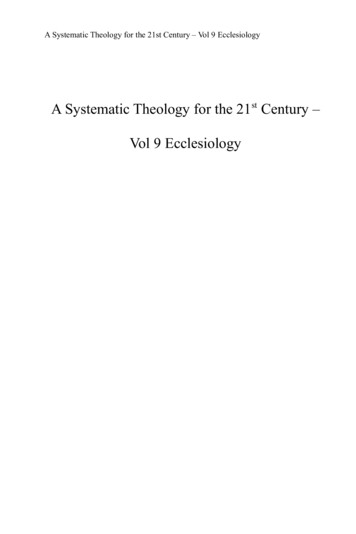
Transcription
A Systematic Theology for the 21st Century – Vol 9 EcclesiologyA Systematic Theology for the 21st Century –Vol 9 Ecclesiology
A Systematic Theology for the 21st Century –Vol 9 EcclesiologyDr. Edward G. Rice
Copyright: Creative Commons Attribution 2.0"Share — copy and redistribute the material in any medium or format, and Adapt —remix, transform, and build upon the material for any purpose, even commercially."Edward G. RicePublished byGood Samaritan Baptist Church GSBaptistChurch.com54 Main St. Box 99, Dresden, NY hCover Design and Photographs by:Edward G. RiceScripture Quotations are from the non-copyrightKing James Authorized Version
A Systematic Theology for the 21st Century– Vol 9 EcclesiologyDownload pdf at www.GSBaptistChurch.com/theologyTable of ContentsA Systematic Theology for the 21st Century – Vol 9 Ecclesiology.1Volume 09 Ecclesiology The Doctrine of the Church.1Chapter 1 Ecclesiology Introduction.1Ecclesiology Precursor .2God Shall Fulfill Promises Made To Israel.3Messiah Shall Reign From Zion.3Roman Catholic Saint Origen Was Wrong.5The LORD God's Promises To Israel Are Literal.8The Effect of This Precursor.12Chapter 2 Ecclesiology One of God's Seven Dispensations.15The First Dispensation – Innocence.16The Second Dispensation – Conscience .18The Third Dispensation – Government .19The Fourth Dispensation – Promise .21The Fifth Dispensation – Law.22The Sixth Dispensation – Grace and Truth.24The Seventh Dispensation – The Kingdom.26Dispensational's Alternative, Supersessionism.29The Facts and Flaws of Covenant Theology, Part 1.31The Facts and Flaws of Covenant Theology, Part 2.34The Facts and Flaws of Covenant Theology, Part 3.37The Facts and Flaws of Covenant Theology, Conclusion.41Chapter 3 Cambron's Bible Doctrine of Ecclesiology.45Cambron's Ch VII Ecclesiology - The Doctrine of the Church.46I. The Meaning of the Word.46II. The Use of the Word.48III. What the Church is Not.49IV. What the Church Is.50V. The Gifts to the Body.54VI. The Local Church.55VII. Discipline in the Local Church.56VIII. Ordinances in the Local Church.57v21cent vol09Ecclesiology.odt 02/18/22
Chapter 4 True Church History.64The Prophetic History of The True Church.64The 1st Century Bible Record – True Church History. .68H.A. Ironside's Lecture 3 The Seven Churches .68H.A. Ironside's Lecture 4 The Seven Churches (Continued) .85The 19th Century Baptist Record – True Church History.97Compendium of Baptist History – First Chapter .98Memorials of Baptist Martyrs - Preliminary Historical Essay. 101A History of the Fundamentalist Movement.120Chapter 5 Bible Ecclesiology vs A Holy Catholic Church.128Roman Catholic Religion - The Mother Wolf .128Protestant's Reformed Theology – An Offspring Wolf .132Protestants Carry on in Error.133Baptists Are Not Protestants .133Ecumenical Bible Changers – Offspring of the Offspring.137The Bible and the Local, Non-Catholic, Church.144Chapter 6 When Did Cfhrist's Church Begin? .148Covenant Theology lism.150Biblical Dispensationalism .152When The Church Age Will Close.153Chapter 7 The Church and the First Amendment.156Chapter 8 Critique of Other Systematic Theology Ecclesiology Works.170Critique of Chafer's 1948 Ecclesiology.171Critique of Chafer's Volume IV Ecclesiology Introduction.172A Critique of Dr. Chafer's Ecclesiology.174Chafer's Systematic Error, What is Truth?.174Chafer's Ecclesiology.176Chafer's Error In Denominationalism .181Clarifying the Corporate Body.182Dr. Chafer's Poisonous Root.183Critique of John Miley's 1892 Methodist Ecclesiology.186Critique of Charles Hodge's 1878 Ecclesiology.190Critique of Augustus Strong's 1907 Ecclesiology.192Critique of Theisens' 1949 Ecclesiology.196Who is Dr. Henry Clarence Thiessen ?.197TH504 Report on Thiessen's Ecclesiology.198vi21cent vol09Ecclesiology.odt 02/18/22
Objective 1. The theological issues of the church;.198Objective 2. The Church definition and founding.199Objective 3. The Churches organization and ordinances.200Objective 4. as well as the Churches mission and destiny.201Objective 5. How this age closes with final apocalyptic eventsis researched.202Thiessen's Chapter 35 Q&A Obj. 1 & 2.203Thiessen's Chapter 36 Q&A Obj. 3. .206Thiessen's Chapter 37 Q&A Obj. #3.210Thiessen's Chapter 38 Q&A Obj. 4.212Critique of Geisler's 2002 Ecclesiology.215Chapter 9 Ecclesiology Conclusion.219Bibliography .223vii21cent vol09Ecclesiology.odt 02/18/22
viii21cent vol09Ecclesiology.odt 02/18/22
PrefaceGreetings in the name ofthe Lord Jesus Christ.As a USAF retiredsystems engineer turnedBaptist Preacher of theGospel of our Lord JesusChrist, and armed with astaunch belief in thepreserved accuracy of theinspired Scriptures, Ipraise the Lord that hehas provided me the unique opportunity to assemble “A SystematicTheology for the 21st Century.”As a systems engineer for thirty years (since 1972), I focused onsystems analysis. Systematic theology has intrigued me ever since myfirst Bible institute course in 1975. I have amassed multiple systematictheology books and never found one that is wholly Biblical. In 2013my seminary work at Louisiana Baptist Theological Seminary, underDr. Steven Pettey, assigned me to read and analyze six volumes of“Systematic Theology” by Lewis Sperry Chafer, the founder andprevious president of Dallas Theological Seminary. Initial critique ofthis neo-evangelical's voluminous, wordy, often unorganized work,answered the question, “Is there not a cause?” A Systematic Theologyfor the 21st Century is indeed a valid need. It cried out to be writtenand it was a work that I was privileged to endeavor.God says he built man with an inner knowledge of the Creator'seternal power and Godhead. Further, God reveals from heaven, toevery man, his wrath against all ungodliness. This true Light “lightethevery man that cometh into the word.” The Bible says the righteousGod, The LORD of hosts, tries the reins and the heart of every man.The prophet Jeremiah writes of God, “I the LORD search the heart, Itry the reins, even to give every man according to his ways, andaccording to the fruit of his doings.” The psalmist says, “my reins alsoinstruct me in the night seasons.” With his tugs on the reins of yourheart, you have come far in your studies, be sure that you have come toa knowledge and submissive acceptance of God's only begotten Son,the Lord Jesus Christ. The beloved Apostle John wrote, “And manyix21cent vol09Ecclesiology.odt 02/18/22
other signs truly did Jesus in the presence of his disciples, which arenot written in this book: But these are written, that ye might believethat Jesus is the Christ, the Son of God; and that believing ye mighthave life through his name.”Every Bible student is encouraged to follow through a list of Bibleverses called by some the Romans road to heaven. The believing Biblestudent is encouraged to memorize them. That quintessential list ofverses is John 3:16-19, 36, 5:24, Romans 3:10, 23, 5:8, 12, 18-19,6:23, and 10:9-13. That last reference is God's formal acceptancepolicy for your receiving his free gift of salvation and eternal life. Gotlife? The beloved Apostle John writes, “He that hath the Son hath life;and he that hath not the Son of God hath not life.” Selah! It is Hebrewfor “go-figure”, and it intends that you pause, meditate, and considerwhat you just read.After due consideration of the sole source of a systematictheology in Volume 01 – Prolegomena and a Volume 02 – Bibliology,an appropriate course of study would entail the study of God theFather, God the Son and God the Holy Spirit. That is the course ofstudy for Volume 03 – Theology, Volume 04 – Christology and Volume05 – Pneumatology. Such a discipline establishes a foundation for theother studies of this systematic theology. Volume 06 through 08pursue the plight and salvation of man with titles Anthropology,Hamartiology, and Soteriology, and finally Volume 09 through 11pursue the doctrines of the church, angels, and last things, in titlesEcclesiology, Angelology, and Eschatology. The set concludes with aVolume 12 – Epilogue.In researching for this volume on ecclesiology, the doctrine of thechurch, I found that the Roman Catholic teaching that the church is aHoly Catholic Church and their teaching that it replaces Israel are themost detrimental influences to an overall Biblical understanding of thechurch. Those errors invade every Protestant denomination, andconsequently the “poisonous fruit” invades all areas of Reformedtheology. Baptists are not Protestant but the leaven then invades evenBaptist theology. A conscious guard against a Catholic Church and itsReplacement Theology via Covenant Theology is the first address ofthis ecclesiology. There is no wading pool, as it were, for a reproof ofthese errors in ecclesiology or in eschatology and the Bible studentshould be prepared to dive right into this powerful volume. May Godbless your head first dive, and may the Holy Spirit of God guide youx21cent vol09Ecclesiology.odt 02/18/22
through this sticky wicket. (A “Sticky wicket” in the game of Cricketis the area of ground around a wicket when it is tacky because ofrecent rain and therefore does not allow the ball to bounce well; it is ametaphor used to describe a difficult circumstance.)When I began work on my Ph.D. in 2014 I set a goal to finish thisSystematic Theology for the 21st Century in a five year period. When Ifinished my Ph.D. in 2017, I reestablished the same goal. This year,after publishing at least a draft of all twelve volumes in 2019, the goalremains. My plea for critique and correction also remains the same. Iprefer friendly and constructive critique, but have found the hostileones to be enlightening and beneficial for rounding out a strongerdefense of truth. Feel free to engage in this effort, the many inputs Ihave received have strengthened the cause.There is a cause.xi21cent vol09Ecclesiology.odt 02/18/22
Vol 9 Ecclesiology The Doctrine of the ChurchVolume 09 Ecclesiology The Doctrine of the ChurchDownload pdf at www.GSBaptistChurch.com/theologyChapter 1 Ecclesiology IntroductionAnd Simon Peter answered and said, Thou art theChrist, the Son of the living God. And Jesus answeredand said unto him, Blessed art thou, Simon Barjona:for flesh and blood hath not revealed it unto thee, butmy Father which is in heaven. And I say also untothee, That thou art Peter, and upon this rock I willbuild my church (1577 εκκλησια ekklesia ek-klay-see’-ah);and the gates of hell shall not prevail against it.(Matthew 16:16-18)1Ecclesiology is the doctrine of the ecclesia, translated toEnglish as the church. The origin of the word church comes fromthe Greek word kuriakos, meaning "the Lord's house." The Englishdefinition was extended to some extent to make it capture the fullconcept of Christ's Ecclesia. It had to capture that the Ecclesia is "acalled out and assembled body of believers," i.e. believers in theLord Jesus Christ. Three integral parts of this basic definition needto be emphasized. The church is "called out", it is "assembled", andit is "a body." The King James Bible consistently translates theGreek word 1577 εκκλησια ekklesia ek-klay-see’-ah “church” onehundred-and-fifteen times, and appropriately translates it assemblythree times in Acts 19:32, 39, 41.The Roman Catholic, Eastern Orthodox, Anglican, andProtestant theology and doctrine have all and always consideredthe church to be one united catholic, universal, entity. The error inthe concept of a Holy Catholic Church, originated in The HolyRoman Catholic Church. After Protestants broke from theirmother, The Holy Roman Catholic Church, there was consternationabout this doctrine and many devised a solution whereby the Holy1 The Holy Bible1
A Systematic Theology for the 21st CenturyCatholic Church was. invisible, but still Catholic.Baptists have historically held to the Biblical view that thechurch is a local, independent, autonomous body with nodenominational head, only Christ is head of the church. Thecorporate body of Christ being built and referenced in Matthew16:18, is not a Holy Roman Catholic Church, nor a Holy CatholicProtestant Church, nor an invisible Catholic Church. It was seen insoteriology that a genuine born-again-saved individual is by themiraculous power of God, instantaneously converted, justified,quickened, indwelt, and baptized into Christ. In the latter of thesimultaneous, instantaneous acts the individual is wholly immersed(baptized) into the corporate body of Christ and is made one withhim. In this world that believer is called upon to be baptized andunited with other believers in a local, independent, autonomousbody called a church and continue in the apostles' doctrine andfellowship (Acts 2:40-41). There is no unified, universal, catholicchurch with a visible or invisible, human or denominational headotherwise involved in this operation.That local church doctrine is espoused in this work, but beforedetailing it, and distinguishing it, it is important to understand thehistorical background of why Christendom went through the widegate and travels on the broad way of the Roman Catholic Church,its Covenant Theology, and its Replacement Theology. There needsto be, as it were, a precursor to ecclesiology, one wherein thepromises that God made to Israel stand solidly and separatly apartfrom the church, and wherein the church age is recognized as astand alone dispensation with a distinct beginning and adispensational ending. That precursor is so essential it is part ofthis introduction to the doctrine of the church.Ecclesiology PrecursorBefore one can safely and successfully pursue a study of thelocal, autonomous, independent church there are three things thatmust be nailed down in their belief system. These are essential toecclesiology because Satan's major inroad into the church wasthreefold: 1) Rome's presuming that it would replace Israel as2
Vol 9 Ecclesiology The Doctrine of the ChurchGod's chosen people, 2) that the Holy Catholic Church would rulethe world, and 3) that there would therefore be no need of a literalthousand year reign of Christ. These lies permeate all Protestantand Reformed theology. Careful attention must be given to thesethree lies before full understanding can be given to ecclesiology.God Shall Fulfill Promises Made To IsraelFirst understand that God will fulfill the promises that hemade to Israel.“Who is a God like unto thee, that pardonethiniquity, and passeth by the transgression of theremnant of his heritage? he retaineth not his anger forever, because he delighteth in mercy. He will turnagain, he will have compassion upon us; he willsubdue our iniquities; and thou wilt cast all their sinsinto the depths of the sea. Thou wilt perform the truthto Jacob, and the mercy to Abraham, which thou hastsworn unto our fathers from the days of old.” (Micah7:18-20)God made some substantial promises about, and to, the twelvetribes of Israel. Promises about inheriting the promised land, aboutbeing regathered into the promised land, about dwelling in peaceand prosperity in the promised land, and about all nations comingto them to seek after the LORD their God. Christendom has triedto spiritualize and steal these promises, to allegorize away thenation of Israel, and to detract from the holiness of God's holyland. What God promises God completely delivers.Messiah Shall Reign From ZionSecondly, God promised that his Messiah, the anointed one,the Christ, would rule and reign over the nations of this world fromthe throne of David set in his Holy Hill of Zion. One must insistthat this promise be completely and literally fulfilled in a period oftime here on this earth. It must fit in before the new heaven andnew earth of Revelation 21, and it must fit in before the great whitethrone judgment of Revelation 20. This is an essential key to3
A Systematic Theology for the 21st Centuryunderstanding any doctrine of last things, eschatology, and incomprehending that the dispensation of grace, i.e. the church age,will come to an end as God's focus turns to the restoration ofIsrael. The Roman Catholic Church's ecclesiology thoroughlymuddied the water and Christendom, in whole, cannot and neverhas seen the truth.All Roman, Eastern Orthodox, Anglican and Protestant (i.e.Presbyterian, Reformed, Episcopalian, Methodist, Pentecostal, andall their splinter groups) theology and doctrine has missed thesetwo critical understandings; 1) God will literally fulfill thepromises he made to Israel, and 2) God will literally establish hisMessiah on the throne of David in his Holy Hill of Zion. There,from Zion, the Lord Jesus Christ will rule all the nations of theworld while Israel is restored in his promised land. Without thesetwo truths firmly embedded and believed one cannot have “an earto hear” the Revelation of Jesus Christ, i.e. “He that hath an ear,let him hear what the Spirit saith unto the churches” (Rev 2:7 – tothe angel of the church of Ephesus); “He that hath an ear, let himhear what the Spirit saith unto the churches” (2:11 – to the angelof the church in Smyrna); “He that hath an ear, let him hear whatthe Spirit saith unto the churches” (2:17 – to the angel of thechurch in Pergamos); “He that hath an ear, let him hear what theSpirit saith unto the churches” (2:29 – to the angel of the church inThyatira); “He that hath an ear, let him hear what the Spirit saithunto the churches” (3:6 – to the angel of the church in Sardis);“He that hath an ear, let him hear what the Spirit saith unto thechurches” (3:13 – to the angel of the church in Philadelphia); “Hethat hath an ear, let him hear what the Spirit saith unto thechurches” (3:22 – to the angel of the church of the Laodiceans).22 There are some things to be noted in this seven-fold repetition of the “ear tohear” verses. 1) The written message goes to individual, independent,autonomous, local churches, not to a Catholic (universal) Church that mightwant to control its “denominations.” 2) The written message goes to “theangel of the church” not to the congregation directly. This angel, messenger,elder, bishop, pastor is singular with one (singular) assigned to eachindependent, autonomous, local church. Sheep need to be fed and in God'seconomy each local congregation has one Elder (presbyter), Bishop(overseer), Pastor (shepherd) assigned to “feed my sheep.” 3) the message is4
Vol 9 Ecclesiology The Doctrine of the ChurchRoman Catholic Saint Origen Was WrongThird and lastly, before one can safely and successfully pursuea study in eschatology or ecclesiology they need to understandwhat the allegorical method of Bible interpretation is, where itcomes from, and why they must totally abandon it and itspremises. To those with a Roman Catholic background and to thosegrounded in a Protestant/Reformed background, this will be aword-for-word identical for all seven churches, but not, again, addressed toany Catholic Church. This sets a premise that God has, and God recognizes,no Catholic Church, and no “denomination” of churches; God onlyestablishes and speaks to local, independent, autonomous churches. 4) Eachindividual message to each individual church is what the Spirit is saying “tothe churches.” It is not to the Roman Church, nor is it to any Catholic Churchor denominational head. It is to the churches, which logically extend to alllocal churches of all ages. The seven messages to seven churches parallel the2,000 years of church history that has unfolded. The message to Ephesusmarks the beginning of the church age, and the messages to the Laodiceansmarks the end of the church age. The parallel fit, all the way through these2,000 years, is noticeable and not just a coincidence, as Romans andProtestants pretend. 5) There are seven repetitions and seven is a Biblenumber of completeness. This completeness further solidifies the previousassertions refuting the catholicness of any church. 6) Ear is singular here. Ineach of Christ's parable exclamations he declares this using plural“whosoever hath ears to hear.” but in each use in Revelation “ear” issingular, “an ear to hear.” It could be an indication of a half-hearted listenerand a stronger emphasis to pay the more diligent attention. i.e. even if youonly have one ear engaged in this revelation, pay all the more earnest heed.7) The first and last church messages address the church “of” Ephesus, andthe church “of the” Laodiceans, the other five messages address the church“in” Smyrna, Pergamos, Thyatira, Sardis, and Philadelphia. There issignificance to this; things that are different are not the same. A church “in”Philadelphia differs from a church “of” Ephesus. Belief in verbal inspirationmakes it so. I will not here codify that difference except to say that I pastor aBaptist church in Dresden which is not the church of Dresden. Notice in thearticle and title that there is also a difference in “of Ephesus” and “of theLaodiceans.” Ephesus was a church of Christ, while the Laodicean one was achurch of the Laodiceans. Also consider that the Greek construct for thechurch of/in Smyrna follows similar to that of the church of the Laodiceans,without the word “in” (also lacking the article and articulation ofSmyrnians). I am not sure why the fifty-seven expert linguists who tookseven years to translate the Authorized Version put it down as the church5
A Systematic Theology for the 21st Centuryreproof. A correction, as called out in 2Timothy 3:16, is a turningwhich brings on back on a proper course, but a reproof in that samescripture means going all the way back to the drawing board andstarting over. Those who learned to rely on allegorical methods ofBible interpretation must go all the way back to the drawing boardon this issue.In the Bibliology section of this work, under the chapterBiblical Hermeneutics, the allegorical method has been quitethoroughly exposed and refuted. Its most detrimental and obviousdefect is found in eschatology and ecclesiology, but its leaven ispresent in each Bible doctrine considered in this systematic work.The allegorical method of Bible interpretation is the primary forcebehind the rejection of the first two points of this thesis, that Israelhas a promising, and promised, future, and that Christ will rulefrom the throne of David, situate in God's Holy Hill of Zion.Origen of Alexandria Egypt (AD 182-254) carefully followedhis mentor Clement of Alexandria Egypt (AD 150-215) who hadconcluded that after the AD 70 fall of Jerusalem, and thesystematic annihilation of every Jew in the land, God could neverput Israel back together again. It was impossible. In his effort tohelp God out of such an embarrassing situation Origen ofAlexandria Egypt began tinkering around with his Bible. He wasgenius and effective. He became known as “The Father of BiblicalCriticism”, “The Father of the Allegorical Method”, and ergo “TheFather of Roman Catholicism.”Origen Adamantius determined that he would spiritualize allthe promises made to and about Israel and apply them to thechurch. Three things were necessary for such a monumental task.First, the Bible had to be extensively picked at so that what wasplainly written was not necessarily what was actually meant: thusOrigen's title as a “Bible Critic” doing “Biblical Criticism.” Next arevolutionary new way of doing Bible interpretation needed to be“in” Smyrna, instead of the church “of” Smyrna, but seeing I only took oneyear of Greek and only passed with a C, I will trust them in their decision.When analyzing a verbally inspired, infallible, inerrant Bible one cannot readto much into little word variations like these. All Roman, Eastern Orthodox,Anglican and Protestant theologies hold to a catholic church anddenominational controls. Which denomination is right? None.6
Vol 9 Ecclesiology The Doctrine of the Churchformalized. But God had made extensive, all encompassing, andeternal promises to the seed of Abraham, to the twelve tribes ofIsrael, and to King David and his seed. How could all these literalpromises be wholly discarded or refocused to the church?In Origen's allegorical method of Biblical interpretation,“Scripture is NOT to be interpreted according to normalcommunication rules”, “Scripture, he supposed in the 2nd centuryafter Christ, has many meanings, a literal sense, a moral-ethicalsense, and a spiritual-allegorical-mystical sense”, and Bible words,even certain letters, have SECRET significance only to bedeciphered by those who have an inside knowledge. Ergo the Biblehad many meanings and none can be certain.3 Commoners, readingthe Bible, presuming that it follows normal communication rules,were, and are, a threat to Origen's allegorical method. Thesecommoners, or “lay-people”, must be dealt with. we, “theclergy”, as Origen supposed, and subsequent denominational headsthinking themselves to be “the clergy” supposed, must stop themfrom reading the Bible. This clarifies a thousand-years of Bibleburning, translator burning, and Bible revision-mongering.The third thing Origen needed to do in order to remove Israelfrom God's agenda and apply all their promises to the church, wasto make the church catholic. Israel was one nation and waspromised world domination, and thus the church needed to be one,universal, catholic entity headed for world domination. Israel waslined up to rule all the nations of the world from Jerusalem, andthus the Catholic Church had to be staged in order to take over thatpromise. Staged to rule the world from Rome, labeled “MysteryBabylon” by the Roman Catholic Church herself.To understand eschatology, yeah to understand ecclesiology,one must disavow all the effects brought on by the Father ofBiblical Criticism, the Father of the Allegorical Method, and theFather of the Catholic Church. Clearly God says what he meansand means what he says, and the allegorical method of Biblicalinterpretation needs to be completely discarded, it has evil roots.Christ will sit on the throne of David in God's Holy Hill of Zion3 Edward Rice, “Systematic Theology for the 21st Century – Bibliology,”Chapter 13 Hermeneutics, 2018, pg 485.7
A Systematic Theology for the 21st Centuryand rule all the nations of the world, the Catholic Church will not,Israel will inherit and dwell in the entire promised land, theCatholic Church will not.Only when one grasps this systematic understanding of God'songoing relationship with his chosen nation, Israel, can they seethat the church is a parenthesis in his dealings with the nations ofthis world and the restoration of his chosen nation. RomanCatholic, Eastern Orthodox, Anglican, Protestant, Reformed,Methodist, and Pentecostal theology and doctrine is grosslyhandicapped when it comes to ecclesiology and eschatology. Theyhave been so handicapped since their founding. The source of thathandicap is their rejection of Israel as God's chosen people.The LORD God's Promises To Israel Are LiteralExamine if you would, Go
my seminary work at Louisiana Baptist Theological Seminary, under Dr. Steven Pettey, assigned me to read and analyze six volumes of "Systematic Theology" by Lewis Sperry Chafer, the founder and previous president of Dallas Theological Seminary. Initial critique of this neo-evangelical's voluminous, wordy, often unorganized work,


